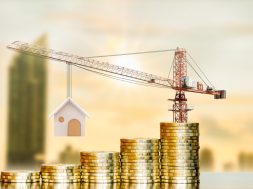Construction industry expectations on budget 2024-25

The interim budget for 2024–25, scheduled for presentation by Finance Minister Nirmala Sitharaman on February 1, 2024, holds the promise of shaping India’s economic trajectory. This crucial fiscal outline is not only anticipated to influence economic strategies but also holds the potential to impact the lives of citizens across the nation significantly. Industries are on the edge of their seats, awaiting key policy decisions in the Union Budget 2024–25. This budget faces the intricate challenge of balancing fiscal prudence with populist measures, especially with general elections looming. Sectors such as pharmaceuticals, automobiles, and real estate have fervently presented their expectations to ACE Update magazine.
In this interim budget, the government is contemplating expanding the Production-Linked Incentive (PLI) scheme, aiming to fortify the manufacturing sector and create more employment opportunities. Initially introduced in 2021, the PLI scheme currently spans 14 sectors, possibly including additional sectors in the upcoming budget. Furthermore, the FAME III scheme is expected to provide impetus to e-buses in this fiscal outline.
The automotive industry, in particular, is brimming with optimism and expects unwavering support from the government. The budget forecasts a series of policies from the Finance Minister that will champion the global Make-in-India initiatives and provide robust support to the automotive ecosystem. The logistics sector is also poised for transformative initiatives to propel India towards achieving its ambitious goal of a USD 5 trillion economy.
In the steel sector, there is anticipation for incentives aimed at adopting new-age technologies, thereby promoting efficiency and sustainable growth. Similar expectations extend to the aluminium industry, with hopes for measures encouraging research and development to drive innovation.
Roads and Highways
Under Nitin Gadkari’s leadership, the Ministry of Road Transport and Highways anticipates a 25 percent increase in the budgetary allocation to ₹ 3,25,000 crore for the Union Budget 2024–25. The focus remains on improving road connectivity, with capital expenditure in the sector witnessing a substantial surge. Despite uncertainties surrounding the interim budget and post-election budgets, there’s an undeniable need for sustained infrastructure spending to meet India’s ambitious targets.
Infrastructure capital expenditure
With projections suggesting India requires nearly $1 trillion in the next decade to meet global infrastructure standards, Budget 2024–25 aims to inject ₹ 1 trillion, equivalent to $125 billion, constituting 3 percent of the total GDP. The emphasis extends to aviation, roadways, railways, ports, and green infrastructure. Investments in these sectors are crucial for boosting externalities and driving GDP growth.
Real Estate Sector
Payal Thaker, Partner at BDO India, sheds light on the real estate sector’s concerns regarding GST. Key recommendations include flexible GST payment options, Input Tax Credit in commercial projects, clarity on land-related rights taxation, exemption for certain redevelopment services, and defining affordability based on carpet area. Aparna Constructions invests ₹. 2425 crore in two major projects, expressing optimism for Hyderabad’s real estate growth and plans for expansion into commercial and retail segments.
Sandeep Runwal, President, NAREDCO Maharashtra, underscores the sector’s anticipation for the 2024-25 budget. Expectations encompass an increase in interest rate deductions, redefining affordable housing, incentives for rental housing, GST revisions, and the expansion of the SWAMIH Fund. Additionally, Pritam Chivukula, Co-Founder & Director of Tridhaatu Realty, anticipates the Finance Minister’s response; the industry seeks to increase the tax slab to ₹. 5 lakh for interest rate deduction. Focus areas include revising the credit link subsidy scheme, introducing incentives for first-time homebuyers, and expanding the SWAMIH Fund.
Moreover, Rohan Khatau, Director, CCI Projects Private Limited, expects to raise the tax deduction limit, adjust affordable housing price caps, grant ‘industry status,’ and increase investments in green and traditional infrastructure for robust growth. Himanshu Jain, VP Sales, Marketing & CRM, Satellite Developers Private Limited (SDPL), appeals for a government package to address the demand shortage; proposals include tax rebate slab increase, consumption boost, social infrastructure development, and employment creation to realise ‘Housing for All.’ Samyak Jain, the Director of Siddha Group, wants the industry to focus on sustaining growth momentum. Key expectations include enhancing access to affordable housing for first-time buyers, revising credit link subsidy scheme caps, and increasing budget allocation for Mumbai’s infrastructure development.
Construction and infrastructure
Rajan Aiyer, VP and MD of Trimble, South Asia Region, anticipates a transformative fiscal approach in construction and infrastructure. The industry seeks government initiatives mandating adopting digital technologies like Constructible BIM, Digital Twin, and digital Asset management solutions. Collaboration, digital transformation support, and skill development are emphasised to propel the sector into a technologically advanced era.
Steel Sector
Indian steel makers respond to subdued prices and surging raw material costs by urging the government to take safeguard measures. They seek import duties, anti-dumping reinstatement, increased customs duty, and quality control orders. Sachin Agrawal, CEO of Bizongo, expects budgetary incentives for adopting new-age technologies. Arun Misra, CEO of Hindustan Zinc Limited, emphasises sustainable growth opportunities, mining infrastructure modernisation, and Production-linked Incentives.
Prefab Construction
Nikhil Bothra, Director at EPACK PREFAB, highlights the role of pre-engineered buildings (PEBs) in efficient construction. He suggests a constructive regulatory framework to enhance PEB utilisation, including considerations like lowering GST and incentivising PEB use in government projects. These measures are expected to contribute significantly to India’s economic goals.
173
Cookie Consent
We use cookies to personalize your experience. By continuing to visit this website you agree to our Terms & Conditions, Privacy Policy and Cookie Policy.








